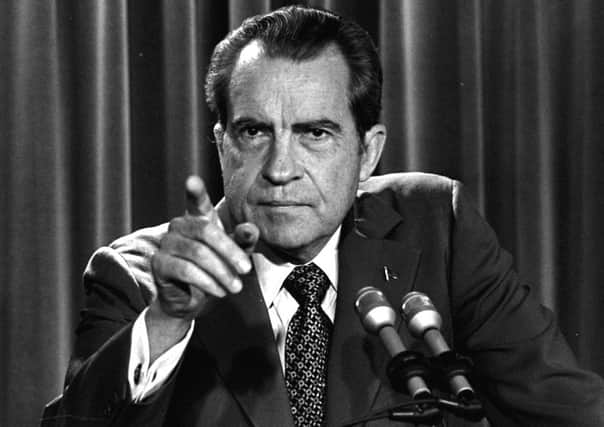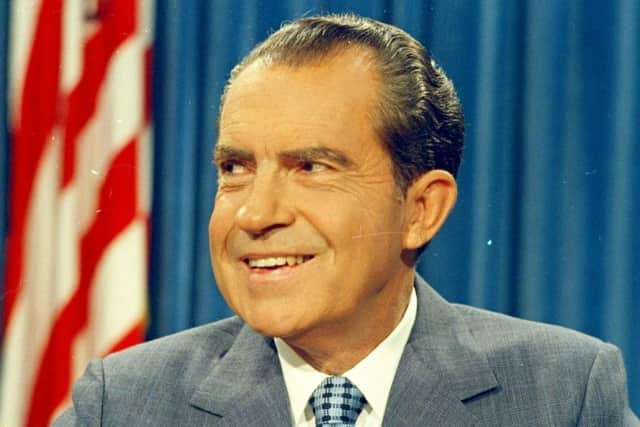Greg Wright: President Richard Nixon casts long shadow over American politics 50 years after his election


In the words of the great journalist Theodore White, 1968 was the year American politics became unhinged. Martin Luther King and Robert Kennedy were assassinated. Riots broke out following King’s murder. Anti-war protesters clashed with police as more young men were flown out to die in Vietnam.
The Democratic convention in Chicago descended into chaos. George Wallace, an unapologetic racist, ran an energetic Presidential campaign that proved alarmingly popular, to liberal eyes at least. And, at the end of this terrible year, the nation sought a leader of integrity, who could bring the country together while finding peace abroad.
Advertisement
Hide AdAdvertisement
Hide AdThe man the Americans chose, albeit by a narrow margin, was the Republican Richard Nixon. Today, he is remembered for the Watergate scandal which destroyed his presidency and confirmed fears about the capacity of power to corrupt.


But, half a century ago, millions of Americans did not see Nixon as an ogre. They elected him as President because they believed he was the saviour of the quiet Americans who cared deeply about their country. They saw him as a statesman, who could bring peace with honour to Vietnam as Americans prepared to place a man on the moon.
Renowned for his gracelessness and vindictiveness, Nixon succeeded – in part – because he convinced voters that he had changed. His CV appealed to conservative voters. He was a former vice president who had pursued communists with evangelical fervour. Many commentators believed the new Nixon really could unite America.
White wrote after witnessing a Nixon speech: “The snarl and self-pity which had coated his campaign of 1960 were gone: the years had mellowed him; what was left was genuine and authentic; true to the inner man.”
Advertisement
Hide AdAdvertisement
Hide AdIn public, President Nixon set out noble goals, and he was at least partially successful in securing them. He thawed relations with China, established detente with the Soviet Union and ended the American involvement in Vietnam. In 1972 he won a landslide victory in the Presidential election over the Democrat candidate George McGovern. But his Presidency was already doomed.
In June 1972, burglars led by G Gordon Liddy and Howard Hunt, working for the Committee to Re-elect the President, broke into the offices of the Democratic National Committee in the Watergate complex with the aim of planting a bugging device. They were caught and identified.
Initially, Nixon dismissed Watergate as a “bizarre business” and Liddy and Hunt stayed tight-lipped. But, as the historian Stephen Ambrose notes, anyone digging deeper on the Watergate saga would have found a wider scandal which reflected Nixon’s paranoid fixation on destroying his enemies through covert actions.
The Watergate scandal was not really about the break-in. It was about the dark world that surrounded it. Nixon almost certainly did not know about the break-in before it happened, but he ordered a cover-up, using the CIA to limit the investigation of the burglary. He recorded himself giving the order on a secret tape recording system in the White House.
Advertisement
Hide AdAdvertisement
Hide AdThe administration died a slow death. Some of Nixon’s officials resigned and were later convicted of offences linked to the cover-up.
Nixon denied any personal involvement, but the courts forced him to give up tape recordings which indicated that he had tried to foil the investigation. He resigned in disgrace in August 1974.
“The word most often associated with Nixon’s character is ‘paranoid’ – and for good reason,” said Dr Rachel Williams, lecturer in American Studies at the University of Hull. “His so-called ‘Enemies List’, which included politicians, businessmen, reporters, and even the actor Paul Newman, has become infamous, but to me it’s indicative of a wider sense of persecution and paranoia which began earlier in Nixon’s political career.
“There’s a certain tragedy to it all. Finally fulfilling his longtime ambitions of becoming President didn’t make Nixon happy, but rather made him even more determined to cling on to power by whatever means necessary, and to see every expression of dissent, anti-war agitation, for instance, as an act of treason and treachery against him, rather than a legitimate exercise of free speech.”
Advertisement
Hide AdAdvertisement
Hide AdDr Kostas Maronitis, a lecturer in politics and international relations, at Leeds Trinity University, said: “Nixon is perceived as a failed Machiavellian figure unable to differentiate between protectionism and globalism, the ethical and the unethical, the private and the public. Yet, Nixon’s political influence is evident in Donald Trump’s protectionist policies and disregard for multilateralism.”
Nixon’s supporters may consider this a harsh verdict on a man who may have made the world a safer place by improving relations with China and Russia, while displaying surprising “green” credentials when he established the Environmental Protection Agency. Nixon’s opponents were hardly saints. Given the choice, many people would rather have a latter day Nixon in the White House than Donald Trump.
They should consider the words of the aforementioned Stephen Ambrose: “Despite the deplorable record of some of Nixon’s Democratic predecessors, no administration in American history was more ruthless, more partisan, more personal or more reckless in its disregard not only for the law but for the decent opinion of mankind as Richard Nixon.”
The “new Nixon” which had been presented to the electorate in 1968, had proved to be phoney. At his inauguration, Nixon claimed to seek “peace that comes with healing in its wings”. But he was no healer and the shadow he cast over American politics still lingers.
Greg Wright is Deputy Business Editor of The Yorkshire Post.